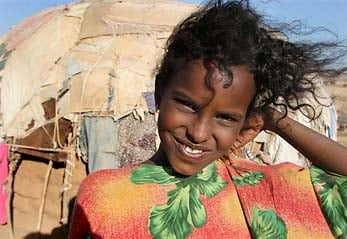Phasing out operations in eastern Ethiopia: Somali refugees to return home
Phasing out operations in eastern Ethiopia: Somali refugees to return home
UNHCR is also moving one step closer to phasing out its operations in eastern Ethiopia, with the last convoy from Aisha camp scheduled to leave tomorrow (Saturday 28 May), for north-western Somalia (the self-declared Republic of Somaliland). With this 213th convoy carrying 325 refugees, UNHCR will have helped more than 240,000 Somali refugees in Ethiopia return home after many years in exile. The Somalilanders in Aisha fled civil war in the 1980s and the overthrow of the Siad Barre regime in 1991.
The remaining 42 refugees in Aisha camp, who are from other parts of Somalia where it is not safe to return, are being transferred to Kebribeyah camp, also in eastern Ethiopia, where they will join 10,324 refugees from central and southern Somalia. With progress on installing a transitional Somali government, many of these refugees hope to return in the future.
After a journey of several hours, the convoy tomorrow will cross the border, and then from the town of Harirad, just inside the Somali border, the refugees will travel back to their home villages. They get a transportation allowance from UNHCR. To help them establish their new lives, UNHCR will also distribute plastic sheeting, blankets, jerry cans, kerosene stoves and a nine-month food supply to the refugees.
UNHCR has been present in Hargeisa, the capital of Somaliland, since 1993 to assist the reintegration process. However, given the high levels of poverty, absence of bilateral development aid and very limited funding to UN agencies and NGOs operating there, glaring gaps remain to be addressed to make voluntary return truly sustainable and to ensure that returnees can enjoy their socio-economic rights.
Aisha Camp, which opened in November 1989 and at its peak in 1991 hosted 26,694 refugees, is to be closed within the next couple of months. This milestone brings us one step closer to phasing out our operation in eastern Ethiopia, an area which 15 years ago was the largest refugee-hosting area in the world. Before it formally closes Aisha and hands the land back to Ethiopian authorities, UNHCR plans to spend $50,000 in rehabilitation activities, including replanting trees and cleaning up the environment.
In July 2004, UNHCR closed Hartisheik camp - once the world's largest refugee camp - which hosted more than 250,000 Somali refugees in the late 1980s.
In addition to some 240,000 refugees UNHCR has assisted home, hundreds of thousands of refugees have returned spontaneously to Somaliland, bringing the total number of returnees in Somaliland to some 700,000.








